What Is Consistent Verb Tense
Verb Tense Consistency
In that location are three chief verb forms for showing time or tense:
Uncomplicated Tense
-
does not use auxiliary verbs
-
refers to specific fourth dimension menstruum during which
something happens
OR
something happened and is over
OR
something will happen
Simple nowadays (action goes on now): I sit
Simple by: (action happened and is over): I sat
Unproblematic future (activeness will happen): I volition sit down
Perfect Tense
- uses have, has, or had as auxiliary verb
- allows action to go on over time
Present perfect (action happened and may all the same be going on): I have sat
Past perfect (action happened before something happened in the by): I had saturday
Hereafter perfect (activeness will be considered in the future, past which time it will accept already happened): I will have sat
Progressive Tense
- uses is, are, was, or were every bit auxiliary verb with -ing ending on master verb
- focuses on �progress� of action
Present progressive (activeness is in progress right at present): I am sitting
By: progressive (action was in progress in the past): I was sitting
Time to come progressive (action will be in progress in the future): I volition be sitting
Each of the in a higher place tenses denotes a specific time for an activeness or result to take place. Writers should be careful to use the exact tense needed to describe, characterize, or explain.
In general . . .
-
Practice not switch from one tense to another unless the timing of an activity demands that you do.
-
Go on verb tense consistent in sentences, paragraphs, and essays.
Verb tense consistency on the sentence level
-
Keep tenses consistent within sentences.
-
Practice not change tenses when at that place is no time modify for the action.
Incorrect:

CORRECT:
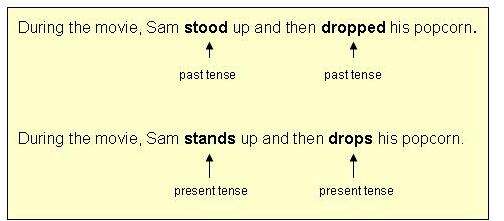
Since there is no indication that the actions happened apart from one some other., in that location is no reason to shift the tense of the second verb.
Note another example.
Wrong:

Right:

The in a higher place sentence ways that Mary walks into a room at times. The action is habitual nowadays. The second activeness happens when the first one does. Therefore, the second verb should be nowadays as well.
Change tense merely when there is a need to do and then.
Usually, the timing of actions within a judgement will dictate when the tense must alter.
CORRECT:
The first action will take identify in the future; therefore, the second one will every bit well.
CORRECT:

The second activity took place in the past; the outset action occurred before the past activity. Therefore, the first action requires the by perfect tense (had + verb).
Verb tense consistency on the p aragraph level
-
Generally, plant a primary tense and keep tenses consequent from judgement to sentence.
-
Do not shift tenses betwixt sentences unless at that place is a time change that must be shown.
Present TENSE PARAGRAPH

All deportment in the above paragraph happen in the present except for the time to come possibility dependent upon a
present action taking identify: " If a cat sees the bird, the cat will kill it."
Past TENSE PARAGRAPH 
All of the actions in the above paragraph happen in the past except for the possibility dependent upon
one action taking place: "If a cat saw the bird, the cat would impale it."
Verb tense consistency on the essay level
one. Employ present tense when writing essays near
- your own ideas
- factual topics
- the action in a specific movie, play, or book
YOUR OWN IDEAS
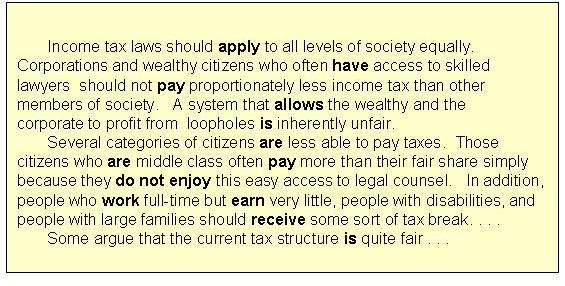
FACTUAL TOPIC
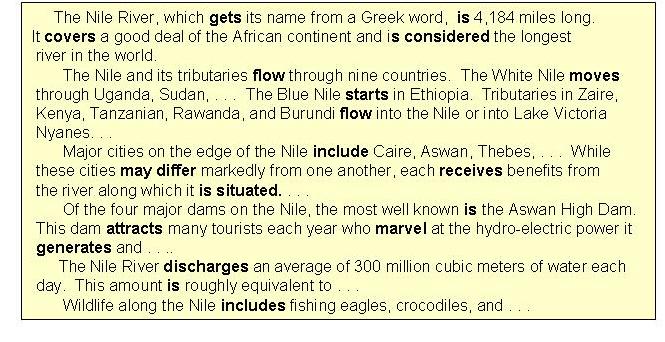
Activity IN A SPECIFIC Pic OR BOOK

Annotation: When quoting from a work, maintain the present tense in your ain writing, while keeping the original tense of the quoted material.
Instance (quoted fabric is shown in blue)
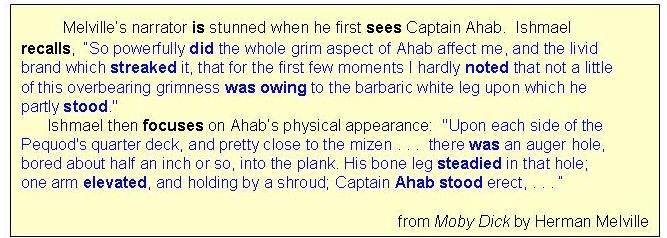
2. Employ past tense when writing about
- past events
- completed studies or findings, arguments presented in scientific literature
EXAMPLE - PAST EVENT

Notation the justified use of nowadays tense in the last judgement (shown in bluish).
Example - SCIENTIFIC Study

iii. Utilise future tense when writing about
- an event that will occur in the futurity.
Instance - Future Event

Remember . . .
-
Alter tense ONLY when something in the content of your essay demands that you do so for clarity.
Note how the following instance incorporates tense change every bit needed to clarify several fourth dimension periods.
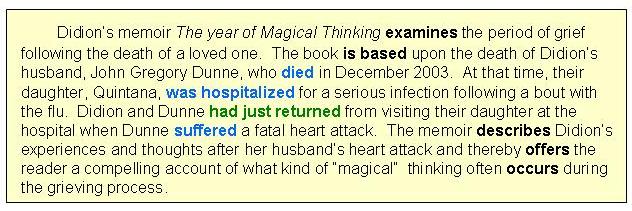
What Is Consistent Verb Tense,
Source: https://webapps.towson.edu/ows/tenseconsistency.htm
Posted by: mansfieldsperve.blogspot.com



0 Response to "What Is Consistent Verb Tense"
Post a Comment